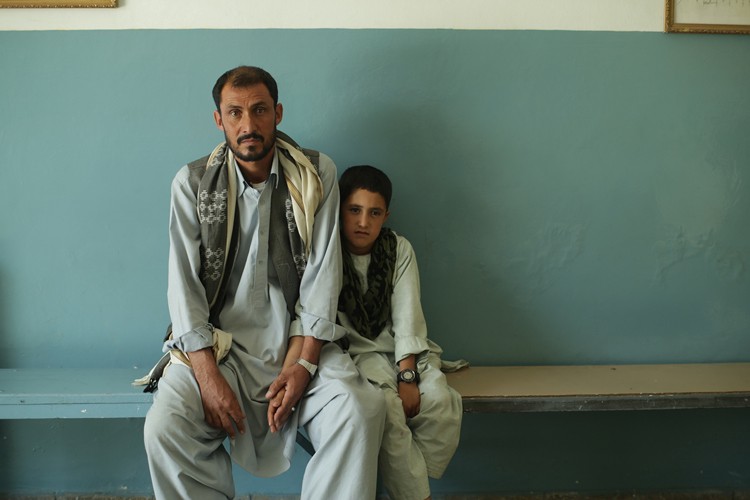Sonia Kennebeck is an independent documentary filmmaker and investigative journalist who has worked for CNN and German public television’s highest-rated and longest-running current affairs program, “Panorama.” She lives in Washington, D.C., where she runs her own production company, Ten Forward Films, that makes films about international politics and human rights. Her previous documentary about the German brothel industry, “Sex — Made in Germany,” was an Official Selection of the 2013 Montreal World Film Festival and the 2014 Festival de Télévision de Monte-Carlo. “National Bird” is her first feature-length documentary film. (Press materials)
“National Bird” will premiere at the 2016 Tribeca Film Festival on April 16.
W&H: Describe the film for us in your own words.
SK: “National Bird” follows the personal journeys of three whistleblowers who speak out against the secret U.S. drone war, a decision that dramatically changes their lives. During the course of the film one of the whistleblowers, Lisa, leads us to Afghanistan where we meet the survivors of one of the most devastating U.S. air strikes that has impacted civilians. The outcome of this trip is surprising, to say the least. “National Bird” is an investigative, political documentary but it also tells very personal and human stories.
W&H: What drew you to this story?
SK: I wanted to bring transparency to the drone program through the voices of people directly involved in — and impacted by — the drone war. Unexpectedly, “National Bird” also became a film about the cost of whistleblowing under an administration that seems to value secrecy more than our First Amendment rights and doesn’t even shy away from investigating whistleblowers and journalists.
W&H: What do you want people to think about when they are leaving the theater?
SK: First of all, I want people to feel some sort of emotion when they leave the theater — be it sadness, hope or anger. Then they should think about the consequences of the drone war and hopefully discuss the issue with their friends and families. Like previous advancements in military technology, combat drones have outpaced legal and moral frameworks.
I think our society has to catch up and the public must decide how we use these weapons — if we want to use them at all. To make this decision, it is necessary to have information. That’s what I am providing with this film.
W&H: What was the biggest challenge in making the film?
SK: Traveling and filming in Afghanistan was the biggest challenge. The security situation has deteriorated in the country and shortly after we arrived there was a large coordinated Taliban attack on the Afghan parliament, which was close to where we stayed. We had to be very cautious during the production, but we worked with excellent and knowledgeable local guides who are well respected in the communities we visited.
It was an important journey for the film and also for me personally so I could understand and appropriately capture the situation of people — families — living under constant war and in fear, and their heartfelt pledge for peace.
W&H: How did you get your film funded? Share some insights into how you got the film made.
SK: Like many independent documentary films, “National Bird” was initially self-funded, which means it was ultra-low budget. Fortunately, I got very early support from the Independent Television Service (ITVS) through their Diversity Development Fund that supports producers of color during the crucial research, development and fundraising phase of a film. That seed money helped me to produce a work-in-progress trailer, which led to full production funding from ITVS.
Later I received international support from the German funders Kuratorium Junger Deutscher Film, FFHSH, DFFF and broadcaster NDR, who also funded “Citizenfour.” And for impact and outreach, we are getting some initial support from Firelight Media, a New York-based organization working with filmmakers of color.
W&H: What’s the best and worst advice you’ve received?
SK: The best advice came from my funder ITVS who encouraged me to hire a full-time producer. I brought Ines Hofmann Kanna on board who became my trusted collaborator for this very challenging documentary project.
The worst advice came from a research contact who said, “Great story idea. You should contact this [famous male journalist]. He can get it done.” I admire the work of many investigative journalists and filmmakers, but every creator has a different artistic vision that is formed by background and experience.
As a non-white woman, I want to contribute my own approach and perspective on national security issues and I believe my identity also helped me to gain unique access to my female lead characters, especially in Afghanistan. A white man would have probably made a very different film.
W&H: What advice do you have for other female directors?
SK: Follow your gut instinct. Don’t be discouraged by rejection and even sexism you might encounter along the way. Get advice from people you admire and trust — and follow your own vision.
Films, especially documentaries, are recording and preserving current events for future generations. It is important that our female and diverse voices, stories and perspectives are part of this collection of visual history, and that includes films about major political issues, war and national security.
W&H: Name your favorite woman-directed film and why.
SK: I don’t have a single favorite film. Generally, I like movies with political themes and science fiction. I remember that I really enjoyed watching Mira Nair’s “Monsoon Wedding” when it came out. I would like to see a big-budget sci-fi movie that’s directed by a woman. In fact, it’s my dream to direct one myself some day.







